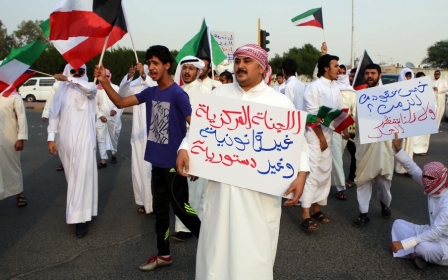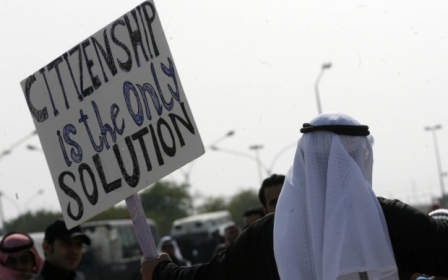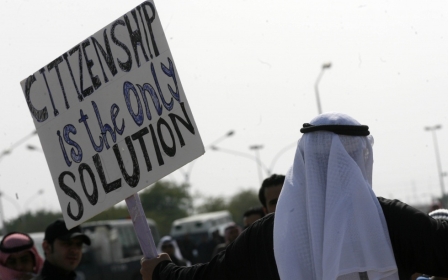Bidoon activists on hunger strike in Kuwaiti prison demand release

Jailed activists from Kuwait’s stateless community have started a hunger strike in protest against their detention, rights groups have said.
According to a statement on Friday by the Gulf Centre for Human Rights (GCHR) and Human Rights Watch (HRW), 15 'bidoon' (stateless) activists detained since July in Kuwait’s public prison on charges related to peaceful protests began a hunger strike on 22 August to demand their unconditional release.
According to the rights groups, the 15 activists on hunger strike are: Abdulhakim al-Fadhli, Ahmed al-Onan, Awad al-Onan, Abdullah al-Fadhli, Mutaib al-Onan, Mohammed Khudair al-Anzi, Yousif al-Osmi, Nawaf al-Bader, Hamid Jamil, Yousif al-Bashig, Jarallah al-Fadhli, Ahmed Shaya al-Anzi, Hamoud al-Rabah, Khalifa al-Anzi and Reda al-Fadhli.
They are all facing charges of “misuse of cellphones and calling for and joining an unauthorised gathering”.
New MEE newsletter: Jerusalem Dispatch
Sign up to get the latest insights and analysis on Israel-Palestine, alongside Turkey Unpacked and other MEE newsletters
According to GCHR, the 15 men are protesting their prison conditions, including overcrowded cells and medical negligence.
The centre said the bidoon activists have been arrested in violation of their right to freedom of expression and assembly. The men were detained in the wake of protests organised in response to the death of a young man belonging to the bidoon community.
Ayed Hamad Med'ath, 20, was found hanging by a rope in his shack in Kuwait's al-Jahra governorate after he was denied a job due to his lack of civil documentation.
His suicide sparked protests by the bidoon population, who have been stuck in legal limbo since Kuwaiti independence in 1961.
According to the Kuwaiti government, the number of bidoons potentially eligible for Kuwaiti citizenship was around 110,000 in 2015, but activists claim the actual number is as high as 250,000.
The government claims that most of them are foreigners who moved to Kuwait from neighbouring countries seeking the generous welfare benefits offered to nationals - an allegation bidoon activists deny.
Denial of civil documentation has left bidoons unable to work, marry, travel or have equal access to education, health care and other social services.
On Friday, HRW urged Kuwaiti authorities to address the plight of bidoons and to free the jailed activists.
“Kuwait’s authorities should unconditionally release all bidoon activists who are being held without a recognisable charge under international law,” said Michael Page, deputy Middle East and North Africa director at Human Rights Watch.
“The continued detention of bidoon activists for their peaceful protests reveals the government’s intent to address this longstanding issue through abuse and coercion rather than respecting basic rights.”
Middle East Eye delivers independent and unrivalled coverage and analysis of the Middle East, North Africa and beyond. To learn more about republishing this content and the associated fees, please fill out this form. More about MEE can be found here.





